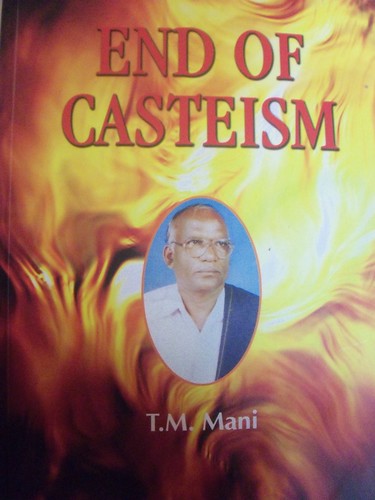Reviewed by M Naushad Ansari,
Book: End of Casteism
Author: T.M. Mani (Now T.M. Umar Farooq)
Translation from Tamil: M. Ghulam Muhammad
Pages: 140
Price: Rs. 50.00
Publisher: Vergal Publication, 235, Peters Road, Royapettah Chennai – 600 014
This is an English translation of T.M. Mani’s Tamil book that covers his 52 years of relentless war against casteism and untouchability. The book highlights atrocities perpetrated by the so-called upper-caste Hindus on the Dalit untouchables. The author’s struggle, suffering and achievements are given in detail. In author’s word: ‘even in places where a dog, fox, pig, lamb or cow could move about freely, we were not allowed to move about because we are untouchables.’
Dr. Ambedkar, the architect of Indian Constitution, knew that as long as Dalits remain Hindus, they will be subjected to cruelties, humiliations and indignities. Hence, he tried to legally separate untouchables from Hindus, but got defeated. Many viewed that if such a policy were implemented then the Hinduism will be destroyed and they may become minority. Later, Dr. Ambedkar tried to search for a political solution to the Dalit untouchables’ problem by demanding separate electorate for the oppressed classes. But his attempt was thwarted by Gandhiji who went for an indefinite hunger strike, compelling Dr. Ambedkar to sign Poona Pact. Finally, finding no other option, in 1935 at Nasik district, Maharashtra, Dr. Ambedkar declared his firm resolve to change his religion. He declared that he was born as a Hindu but will not die as a Hindu. About a year later, a massive Mahar conference was held on May 30 and 31, 1936, in Mumbai, to assess the impact of that declaration on Mahar masses, wherein he declared that their conversion will be for material as well as for spiritual gains. ‘To get human treatment, convert yourselves; convert for getting organized; convert for becoming strong; convert for securing equality; convert for getting liberty; convert for that your domestic life may be happy’, Dr. Ambedkar thundered. He also viewed that ‘there are three faiths from among which the Depressed Classes can choose – Islam, Christianity and Sikhism. Comparing these three, Islam seems to give the depressed Classes all they need’. (Thus Spake Ambedkar, Vol – 4)

Dr. Ambedkar’s conversion and Periyar’s strong self-respect movement puzzled the author in dealing with an insulting life. Is life worth living when there is no self-respect or dignity, the author felt! Because of the emotional rather passionate attachment, one does not easily give up one’s ancestral religion. One has to fight a lot against oneself before crossing the Rubicon.
The author laments that after Dr. Ambedkar the leaders of Dalit untouchable movement have not stressed the need for conversion. He finds two reasons for it. The first one was that if Dalit untouchables change their religion, the organizations will lose membership and will become weak. Secondly, the anger of Hindus would affect the political situation seriously. One also loses all the benefits that are available to Dalit Hindus.
The author feels that if conversion of a few families in Meenakshipuram in Tamil Nadu to Islam could create so much furore, what would have happened if millions had changed their religion along with Dr. Ambedkar decades ago, when the condition of Dalit untouchables was much worse! Hence, in author’s view, foreseeing the same, Dr. Ambedkar preferred to convert to Buddhism. However, such conversion failed to yield the desired results, as, to him, change of religion should start with change of name leading to complete change in social life.
Rather than living in utter disgrace the author advises Dalit untouchables to follow Islam which gives equality, fraternity, self-respect and dignity. The author quotes Dr. Ambedkar’s view that ‘Islam appears to be capable of meeting all the political, social and economic needs of the untouchables.’
Publisher of the book views that when the Tamil edition of the book was published, it made a sea change in the lives of Dalit untouchables of Tamil Nadu in South India. The book is a must read for all, in general, and oppressed and suppressed castes, in particular. For a larger benefit, the book needs to be translated into different Indian languages.
